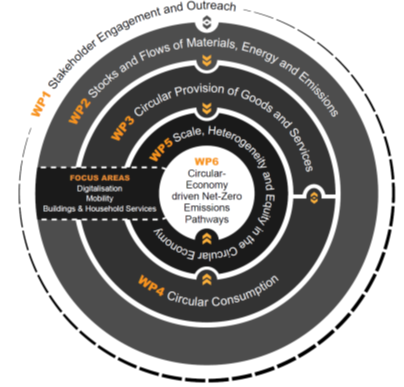Developing Circular Pathways for aN EU Low-Carbon Transition
The CircEUlar project is a four year European Research and Innovation Action
Understand the dynamics and levers for societal transformation towards a net-zero emission circular economy

CircEUlar is a four year European Research and Innovation Action that will develop new modelling approaches for analysing circularity from a systems perspective accounting for:
1) dematerialisation and the transition to a service-based economy to limit material stock growth;
2) lifetime extension of material stocks through repair, maintenance, reuse;
3) waste treatment and material recycling.
CircEUlar’s approach will be comprehensive, combining new data and modelling of economy-wide material stocks and flows, greenhouse gas (GHG) emissions, and industrial value chains across interlinked sectors, with deep-dive analysis of mobility and buildings as material-intensive demand sectors. These two focus areas have large material stocks, potential for circular transformation, and strong dependence on both circular consumption and production practices.
CircEUlar will also focus on digitalisation as a potential enabler of dematerialisation and supply chain circularity.
DURATION
48 months (Starting date: 1 September 2022)
CONSORTIUM
11 organisations from 7 countries
COORDINATOR
International Institute for Applied Systems Analysis
EU CONTRIBUTION
€ 4 495 434
CircEUlar is comprehensive in its modelling approaches, its scientific knowledge base, and its coverage of circular economy potentials and impacts.
-
- empirical analysis of firm and consumer propensities towards circular economy measures;
- industry input on process-level innovations and circular economy business models;
- modelling analysis of economy-wide material stocks and flows, and policy levers of change towards societal transformation.
-
- analysing alternative pathways to net-zero GHG emissions;
- testing effective policy levers for both circular production and consumption.
- assessing outcomes for climate, environment, economy and society, in line with European Green Deal objectives.
